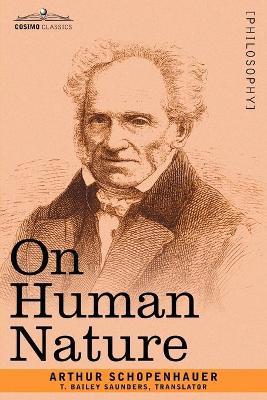On Human Nature

On Human Nature
A disciple of Kant and a significant factor in shaping Nietzsche's thinking, Arthur Schopenhauer worked from the foundation that all knowledge derives from our experience of the world but that our experience is necessarily subjective and formed by our own intellect and biases: reality, therefore, is but an extension of our own will. In this essay, translated by THOMAS BAILEY SAUNDERS (1860-1928) and first published in English in the 1890s, Schopenhauer offers his outlook on human nature... and a pessimistic one it is, for Schopenhauer saw life through a Buddhist-like lens of desire leading to suffering, and the abjuration of desire as the only path to temporary relief. Here, the philosopher examines human institutions such as government, human ideals such as free will, and human understanding of character and morality, and finds underlying them a fatalistic impulse driving culture from extremes of despotism to those of anarchy, with little stopping along the way. Students of philosophy and of 19th-century intellectualism will find this a fascinating read.
99.12Lei
99.12Lei
Livrare in 2-4 saptamani
Descrierea produsului
A disciple of Kant and a significant factor in shaping Nietzsche's thinking, Arthur Schopenhauer worked from the foundation that all knowledge derives from our experience of the world but that our experience is necessarily subjective and formed by our own intellect and biases: reality, therefore, is but an extension of our own will. In this essay, translated by THOMAS BAILEY SAUNDERS (1860-1928) and first published in English in the 1890s, Schopenhauer offers his outlook on human nature... and a pessimistic one it is, for Schopenhauer saw life through a Buddhist-like lens of desire leading to suffering, and the abjuration of desire as the only path to temporary relief. Here, the philosopher examines human institutions such as government, human ideals such as free will, and human understanding of character and morality, and finds underlying them a fatalistic impulse driving culture from extremes of despotism to those of anarchy, with little stopping along the way. Students of philosophy and of 19th-century intellectualism will find this a fascinating read.
Detaliile produsului










